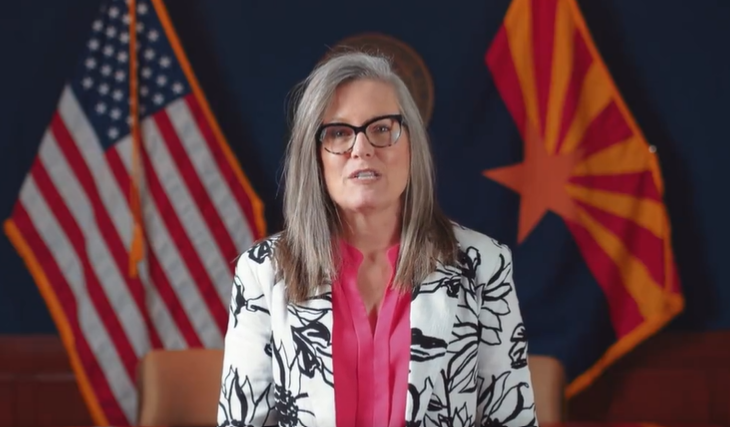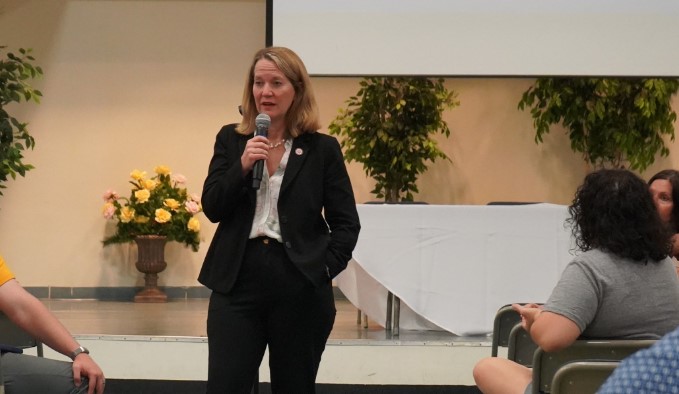
by Corinne Murdock | Nov 4, 2023 | Education, News
By Corinne Murdock |
The University of Arizona (UArizona) is now offering scholarships to illegal immigrants using the nonprofit arm of a leftist dark money network.
The university partnered with TheDream.US to provide the scholarships: an initiative of the New Venture Fund, an initiative by one of the biggest leftist dark money organizations in the nation, Arabella Advisors. That organization recently came under investigation for tax law aversion and illegal profiteering. UArizona President Robert Robbins said that the scholarships would provide opportunities for all Arizona youth regardless of their citizenship status.
“This new partnership with TheDream.US is a crucial step in our effort to make sure that all of Arizona’s youth have the opportunity to attend college and achieve their higher education goals,” said Robbins. “I am proud that the university, as Arizona’s land-grant institution, has entered this partnership, which allows us to serve more incoming students, including Arizona’s Dreamers.”
These scholarships — running up to $33,000 for tuition and fees — don’t require an illegal immigrant to have protections from the Deferred Action for Childhood Arrivals (DACA) or Temporary Protected Status (TPS), so long as they came to the U.S. before the age of 16 and before Nov. 1, 2018, and have graduated from high school.
A full scholarship would cover all but $200 of in-state, on-campus costs of attendance. Should the illegal immigrant live off campus, the scholarship would completely cover costs of attendance with around $10,000 left over.
Some applicants may also receive an additional stipend of up to $6,000 for books, supplies, and transportation.
Illegal immigrants became eligible for in-state tuition last year with the passage of Proposition 308, backed by at least $1.2 million from out-of-state dark money networks.
Last year, TheDream.US partnered with Northern Arizona University (NAU) to offer the same scholarship opportunity to illegal immigrants. Arizona State University (ASU), Phoenix College, and Grand Canyon University (GCU) also partner with TheDream.US.
TheDream.US founders are: Don Graham, chairman of Graham Holdings Company (formerly The Washington Post), former director of Facebook, and former member of the Pulitzer Prize Board; Carlos Guitierrez, chairman and CEO of Empath, former chairman and CEO of Kellogg’s, and former Secretary of Commerce for the Bush administration; and Henry R. Muñoz III, former finance chairman for the Democratic National Committee.
Several among the senior staff at TheDream.US were illegal immigrants themselves. Leading them is president and CEO Gaby Pacheco, an illegal immigrant who didn’t obtain her citizenship until June. As an activist, Pacheco helped inspire the DACA program as enacted via executive order by former President Barack Obama.
Last year, TheDream.US president was Candy Marshall, the former chief human resources officer for the Bill & Melinda Gates Foundation. Marshall now serves as the senior advisor to the organization.
Advisory board members include Lupe De La Cruz, Pepsi vice president of government affairs and corporate citizenship; Mei-Yen Ireland, senior program officer at the Bill & Melinda Gates Foundation; Georgia Levenson Keohane, CEO of the Soros Economic Development Fund; and Andrew Rosen, chairman and CEO of Kaplan.
Corinne Murdock is a reporter for AZ Free News. Follow her latest on Twitter, or email tips to corinne@azfreenews.com.

by Corinne Murdock | Nov 3, 2023 | News
By Corinne Murdock |
The Biden administration announced on Monday that it would begin to factor “statelessness” in illegal immigration cases, effectively opening up another pathway to citizenship. The use of statelessness as a legal tool traces back to efforts by the United Nations (UN) to globally unify and effectively legalize all migration.
“We are updating filing instructions for all deferred action requests, including those from noncitizens who believe they are stateless, and for parole-in-place applications,” stated the U.S. Citizenship and Immigration Services (USCIS).
The taxpayer-funded UN has made it apparent through both their words and actions that they intend to nullify any distinction between illegal and legal immigration, or “global migration governance.” The UN holds that the denial of certain citizenship rights to noncitizens constitutes wrongful discrimination.
For example, the UN High Commissioner for Refugees (UNHCR) advocates for noncitizens to enjoy citizenship rights and benefits such as voting, employment, public education, banking access, housing purchases, and marriage. The UN Conventions on Statelessness aims to establish rights to education, employment, and housing for noncitizens.
Last year, UNHCR was discovered to be facilitating illegal immigration by handing out funds, such as cash debit cards, to illegal immigrants headed to the U.S. The UN dubbed its aiding and abetting system of waystations throughout Mexico the “cash-based interventions,” or CBI.
At the tail end of its press release, USCIS included two links from the UN outlining its goal of ending statelessness.
The USCIS policy guidance was issued on Aug. 1, with Monday serving as the date the policy went into effect. According to the policy, claims of statelessness may be used as a means for justifying illegal immigration.
USCIS included an open-ended list of valid reasons for establishing statelessness. It defined statelessness as having no nationality with any country; the cited federal law defined “national” as meaning a person owing permanent allegiance to a state.
The agency also echoed the UN’s global migration governance advocacy, noting that illegal immigrants — characterized as “stateless individuals” — can’t vote and may not be able to obtain education, employment, health care, property, or registration of life events like births, marriages, and deaths.
Listed examples of justification for establishing statelessness included: a lack of birth registration and birth certificates; birth to illegal immigrant parents; the political change and transfer of territory that may (or may not) alter the nationality status of citizens of the former state or states; administrative oversights, procedural problems, conflict of law between two countries, or destruction of official records; alteration of nationality during marriage or the dissolution of marriage between couples from different countries; targeted discrimination against minorities; laws restricting acquisition of citizenship; laws restricting the rights of women to pass on their nationality to their children; laws relating to children born out of wedlock or during transit; or loss, revocation, or relinquishment of nationality without first acquiring another.
In its Monday press release, USCIS offered instructions for those illegal immigrants considered “stateless” to obtain various types of permissions to remain in the country: deferred action, employment authorization after a grant of deferred action, parole in place, asylum, U or T nonimmigrant status, temporary protected status, or employment authorization with TPS.
The Department of Homeland Security (DHS) first announced the factoring in of “statelessness” for illegal immigrants back in December 2021. As part of this novel approach, DHS committed to coordinating with the Department of State to mitigate the barriers to relief and benefits resulting from statelessness. It also committed to establishing a process to improve data collection efforts as well as securing work and travel opportunities for stateless illegal immigrants.
Corinne Murdock is a reporter for AZ Free News. Follow her latest on Twitter, or email tips to corinne@azfreenews.com.

by Corinne Murdock | Nov 3, 2023 | News
By Corinne Murdock |
Gov. Katie Hobbs is now taking credit for the family tax rebate she opposed initially — and had a state agency break the law in doing so, according to legislative leaders.
Hobbs championed the tax rebate on Tuesday with several surprise links crediting herself for the Arizona Families Tax Rebate Program, including an Arizona Department of Revenue (ADOR) application page for the program displaying her headshot. In a video and press release, Hobbs indicated that she played a major role in passing and had always fully supported the initiative.
“I made a promise that when I took office, I would take every opportunity I had to make it easier for Arizonans to provide for their families,” said Hobbs. “I’m so pleased to be able to deliver this relief.”
However, the webpage and promotional material in concert with Hobbs’ announcement runs afoul of the law on the rebate.
“[N]o letter relating to the Arizona families tax rebate issued under this section shall be sent from the governor’s office, be sent on the governor’s letterhead, or reference the governor’s office,” read SB 1734.
Sen. President Warren Petersen (R-LD14) and House Speaker Ben Toma (R-LD27) issued a cease and desist letter to ADOR over Hobbs’ announcement. The letter declared that the application page that Hobbs directed Arizonans to use was an impermissible detour and an illegal expenditure of public funds.
“While any violation of a controlling statute is troubling in its own right, the Department’s letter compounds an institutional insult with injury to Arizona taxpayers by unlawfully expending significant sums of public money to disseminate what is, in part, a political message,” stated the letter.
The budget did include a somewhat prophetic provision concerning Hobbs: a worry that the governor would subvert policy for political gain.
“Animating this provision was the Legislature’s concern that Governor Katie Hobbs would subvert a commonsense policy measure into a self-serving political stunt on the taxpayers’ dime,” stated the cease and desist letter. “[T]he Department impermissibly misdirected rebate recipients on a detour through the Governor’s curated, self-promotional online platform. This is clear violation of Arizona law.”
State Sen. Jake Hoffman (R-LD15), chairman of the Arizona Freedom Caucus, lamented that ADOR would be on the hook for Hobbs’ public relations display.
“The sad reality exposed by this situation is that Katie Hobbs doesn’t care about anyone other than herself. She tried to play fast and loose with the law, as she so often does, and forced Director Woods to violate it,” said Hoffman. “Thanks to Hobbs, he is now personally liable for $2M+ in illegally spent funds, a 20 percent penalty, court costs, and attorneys’ fees. And with a statute of limitations of 5 years, Katie has given Director Woods the gift of many sleepless nights for years to come.”
Hoffman advised other government agencies to take heed of ADOR’s alleged mistake by resisting pressure from the governor to act and by keeping receipts for everything the governor and her office may request.
Concerning Hobbs taking credit for the program, State Sen. President Pro Tempore T.J. Shope (R-LD16) indicated in a response post that she wanted “no part” of it. Shope said credit was due to the Arizona Freedom Caucus.
“I know the Governor wanted no part of this tax rebate but thankfully, the @AZSenateGOP & @AZHouseGOP caucuses, led by the @AZFreedomCaucus, stood strong and demanded it be part of the State Budget,” said Shope.
State Rep. Austin Smith responded that no House or Senate Democrats contributed to the tax rebate package initiated by the Arizona Freedom Caucus.
Hobbs’ spokesman, Christian Slater, told Capitol Media Services that the governor had supported the tax rebate by signing the budget, despite her initial opposition to the program.
The Sen. Republican Caucus similarly criticized Hobbs for failing to ascribe credit to those who came up with and fought for the rebate.
“You’re a little late to the party,” said the caucus. “Glad you love Republican policies as much as we do. They really do make our state a better place to live, work, and play.”
Sam Stone, “Breaking Battle” radio show host and former Phoenix City Council candidate, called Hobbs’ 180 on the program “pathetic.”
The Arizona Families Tax Rebate Program entitles Arizona taxpayers with dependent children a single payment of up to $750. Approximately 750,000 Arizona families may be eligible.
The rebate metes out to $250 per dependent under the age of 17 and $100 per dependent over the age of 17 as claimed on 2021 returns. A taxpayer can’t claim more than three dependents, regardless of age.
Eligible taxpayers are those who: filed a full-year resident personal income tax return for the 2021 tax year; claimed at least one dependent tax credit for the 2021 tax return; filed the 2021 tax year Arizona personal income tax return as the only taxpayer on a single, married filing separate, or Head of Household return, or as the primary or first-listed taxpayer if filed jointly; and had at least $1 in Arizona personal income tax liability in tax year 2021, 2020, or 2019.
Corinne Murdock is a reporter for AZ Free News. Follow her latest on Twitter, or email tips to corinne@azfreenews.com.

by Corinne Murdock | Nov 2, 2023 | News
By Corinne Murdock |
Attorney General Kris Mayes says she will push for a new “red flag” law to not only take away guns from those viewed as posing a threat to others, but those with whom the individual resides.
“Red flag” laws enable a judge to issue a gun confiscation order if an individual’s behavior indicates they may harm themselves or others. Mayes told AZ Family that her proposed law would also extend to guns owned by others within the same household, not just the individual exhibiting problematic behaviors, should the red flag apply to those under the age of 18.
“We could essentially go after that gun,” said Mayes. “A teacher, or anybody who has lived with that person or lives with that person could apply for a protective order and could get that order against that juvenile.”
Mayes promised that the gun confiscation order would be temporary and focused on ensuring the safety of K-12 and higher education institutions. Those whose guns would be confiscated must defend their right to their guns in court in order to get them back.
“This is probably not going to happen all that often. But for the people who don’t die as a result of us having these protective orders in place, this is probably going to be important and this could make a difference,” Mayes said.
In an interview with the “Mike Broomhead Show” last Thursday, Mayes said the litmus test for obtaining court-ordered gun confiscation would hinge on whether an individual presents a clear and present danger.
“That red flag law would allow a court to remove firearms from a person based on clear and convincing evidence that a person will pose an immediate and present danger of personal injury or death to any person at a K-12 institution or our universities,” said Mayes.
The attorney general’s plans for the next legislative session follow greater pushes from Democratic leaders to establish greater forms of gun control: universal background checks, sweeping bans on “assault” weapons and high-capacity magazines, banning ghost guns, and eliminating gun manufacturers’ liability immunity.
In March, Mayes withdrew the state from a multistate lawsuit challenging the Bureau of Alcohol, Tobacco, Firearms, and Explosives (ATF) regulation on ghost guns. Those are unregulated, unserialized firearms made by buyers from a kit.
Then in May, Mayes filed an amicus brief urging a federal court to support the federal prohibition on firearms sales to individuals under the age of 21.
The state’s Democratic leaders have also pushed back against lawmakers’ efforts to expand the influence of lawful gun ownership on K-12 and university campuses.
Over this last legislative session, Gov. Katie Hobbs vetoed SB 1331, allowing parents to conceal carry firearms on campus; HB 2332, requiring students to undergo firearm training; and HB 2667, barring universities and colleges from prohibiting students from carrying guns on campus.
Corinne Murdock is a reporter for AZ Free News. Follow her latest on Twitter, or email tips to corinne@azfreenews.com.

by Corinne Murdock | Oct 31, 2023 | News
By Corinne Murdock |
A federal court ruled that abortionists can challenge the state’s ban on discriminatory abortions.
The Ninth Circuit Court ruled on Monday in Isaacson v. Mayes that abortionists may petition for an injunction against state law prohibiting abortions based on fetal genetic abnormality, dubbed the “Reason Regulations.” Judges Ronald Gould, Andrew Hurwitz, and Roopali Desai agreed in their ruling with the abortionists’ claim that they endured economic harm. The abortionists blamed the abortion ban’s vagueness for moving them to conduct less abortions out of caution.
Specifically, the abortionists claimed that the discriminatory abortion ban violated the Fifth and Fourteenth Amendments: the threat of prison jeopardized their liberty interest, and the threats of license revocation, monetary damages, and revenue loss jeopardized their property interest. The circuit court dismissed the state’s claim of interest in regulating medical practice.
“That their services include abortion does not alter the fact that Plaintiffs make money providing these services and have lost money because the Reason Regulations restrict what services they can provide,” stated the ruling.
During the trial, the abortionists revealed that patients with likely or confirmed fetal abnormalities made up a significant part of their business.
The “Reason Regulations” made it a felony to either knowingly solicit or accept money to finance an abortion, or to perform an abortion, based on a fetal genetic abnormality.
The abortionists claimed that their overcompliance with the statute was due to the vagueness of the term “genetic abnormality,” and the statute’s lack of details on determining how much that factor had to play into a patient’s decision to get an abortion as well as the level of knowledge an abortionist would have to have in order to be guilty of violating the ban.
Monday’s ruling reversed an Arizona District Court order issued in February allowing the ban to go into effect. The district court rejected the abortionists’ request for a preliminary injunction, since the Supreme Court had just ruled that no constitutional right to abortion existed in its Dobbs v. Jackson Women’s Health ruling last year overturning Roe v. Wade.
The federal court remanded the case back to the district court for it to decide, once more, whether the state ban on discriminatory abortion may go into effect.
A similar ongoing case may nullify the results of Isaacson v. Mayes. In Planned Parenthood Arizona v. Mayes, the Arizona Supreme Court is scheduled to hear oral arguments in December to determine whether the state’s preemptive, pre-statehood, total abortion ban remains enforceable due to the overturning of Roe v. Wade.
The state’s total abortion ban was suspended following the Supreme Court’s 1973 decision in Roe v. Wade that created a constitutional right to abortion. Last year — prior to Dobbs v. Jackson Women’s Health — the state passed its 15-week abortion ban.
Planned Parenthood Arizona v. Mayes would decide which of the two laws has authority in the state.
The state never repealed its total abortion ban. The 15-week ban didn’t preclude the enforcement of any other preceding abortion laws.
Last week, Planned Parenthood Arizona (PPAZ) filed a motion to recuse Arizona Supreme Court Judge William Montgomery for his personal beliefs opposing PPAZ.
Earlier this month, Gov. Katie Hobbs filed an amicus brief to oppose the total abortion ban.
Corinne Murdock is a reporter for AZ Free News. Follow her latest on Twitter, or email tips to corinne@azfreenews.com.





